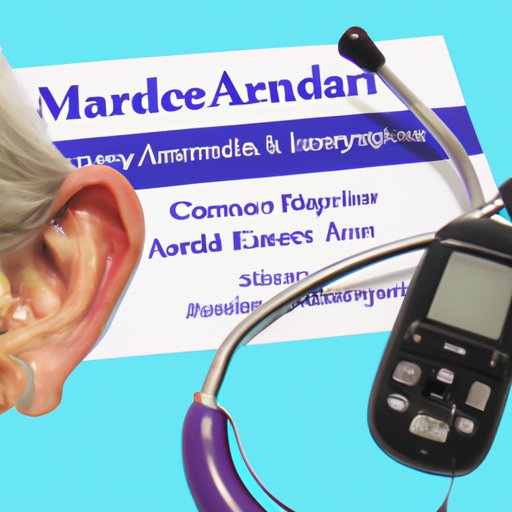Introduction
Hearing loss is a common problem, especially among older adults, and hearing aids can be an effective way to help improve hearing. But hearing aids can also be expensive, and if you’re on a limited budget or have limited health insurance coverage, this can be a major concern. Fortunately, many Medicare Advantage plans offer some coverage for hearing aids, so it’s important to understand what your coverage includes and how to get the most out of it.
This article explores the coverage offered by Medicare Advantage plans for hearing aids, including what services are covered, eligibility requirements, and additional costs. We’ll also discuss what to know when choosing a plan and how to navigate the coverage process.
Exploring Medicare Advantage Coverage for Hearing Aids
First, let’s take a look at what Medicare Advantage is and what types of services it covers. Medicare Advantage plans, also known as Medicare Part C, are private health insurance plans that are approved by the federal government. These plans are designed to provide additional coverage beyond Original Medicare (Parts A and B). They typically include coverage for hospital visits, doctor visits, prescription drugs, and more.
When it comes to hearing aid coverage, Medicare Advantage plans vary in what they cover. Some plans may offer full coverage for hearing aids, while others may only cover certain types of hearing aids or certain services related to hearing aids. It’s important to check with your plan to see what is covered.

What to Know About Medicare Advantage and Hearing Aid Coverage
Before you choose a plan, it’s important to understand the costs associated with hearing aids and how much your Medicare Advantage plan will cover. Most plans will cover some of the cost of hearing aids, but there may be limits on the amount of coverage. For example, some plans may only cover up to a certain dollar amount, while others may limit coverage to a certain number of visits or services.
In addition to the cost of hearing aids, there may be other costs associated with hearing aid coverage. These may include copayments, coinsurance, deductibles, and other out-of-pocket expenses. Be sure to check with your plan to see what these costs may be.
Does Medicare Advantage Cover Hearing Aids?
Yes, many Medicare Advantage plans do offer coverage for hearing aids. However, the specific coverage varies from plan to plan. Some plans may cover all types of hearing aids, while others may only cover certain types. Additionally, there may be other restrictions or exclusions for coverage, such as age limits or pre-existing conditions.
It’s also important to note that not all Medicare Advantage plans cover hearing aids. Some plans may not cover any hearing aid services, or may only cover certain types of hearing aids. Be sure to check with your plan to see what is covered.
An Overview of Medicare Advantage and Hearing Aid Coverage
When it comes to getting the most out of your Medicare Advantage plan when it comes to hearing aids, it’s important to understand the different plans and benefits available. Different plans offer different levels of coverage, so it’s important to compare plans and find one that meets your needs.
It’s also important to understand the costs associated with hearing aids. Medicare Advantage plans typically cover some of the cost of hearing aids, but there may be additional costs associated with hearing aids. Be sure to check with your plan to see what is covered and what additional costs may apply.

How to Get the Most Out of Your Medicare Advantage Plan When It Comes to Hearing Aids
When choosing a plan, it’s important to compare plans and providers to find the best coverage for your needs. You should also look for plans that offer additional benefits, such as discounts on hearing aids or coverage for other hearing-related services.
There are also resources available to help you make an informed decision. Your doctor or other healthcare provider can provide information about the different plans and coverage options. Additionally, you can use online tools and resources to compare plans and find the right one for you.

Navigating Medicare Advantage and Hearing Aid Coverage
Once you’ve chosen a plan, it’s important to understand the fine print. Be sure to read the plan documents carefully and ask questions if you don’t understand something. Additionally, you should contact your plan directly to find out what services and coverage are included.
It’s also important to keep track of your coverage. Keep copies of your plan documents and bills so you can easily refer back to them if you have any questions. Additionally, you should stay up to date on changes to your coverage, such as new policies or restrictions.
Conclusion
Hearing aids can be an effective way to help improve hearing, but they can be expensive. Fortunately, many Medicare Advantage plans offer some coverage for hearing aids, so it’s important to understand what your coverage includes and how to get the most out of it. Be sure to compare plans and providers to find the best coverage for your needs and understand the fine print to ensure you get the most out of your coverage.
(Note: Is this article not meeting your expectations? Do you have knowledge or insights to share? Unlock new opportunities and expand your reach by joining our authors team. Click Registration to join us and share your expertise with our readers.)
